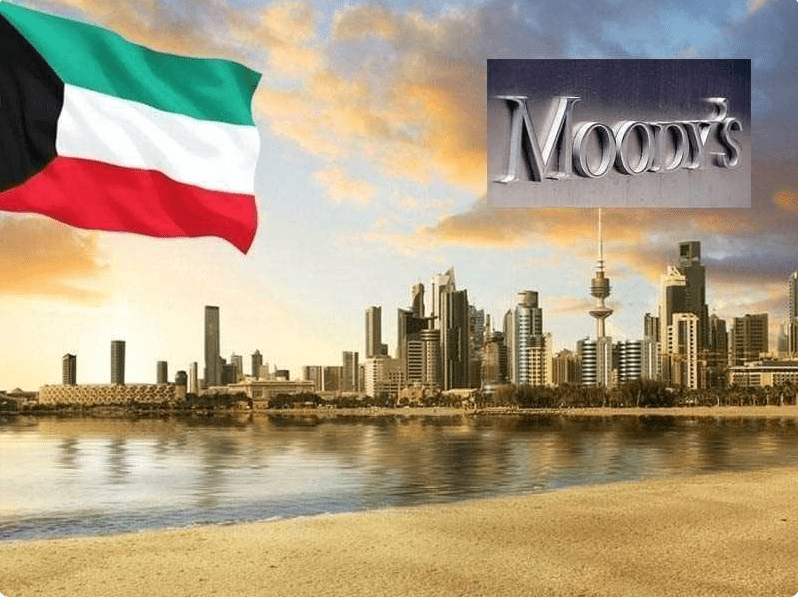Moody’s said that the credit position of Kuwait and the rating of the government of Kuwait at A1 stable depends on the country’s exceptionally huge financial reserves and huge oil and gas reserves with low production costs and very high income levels, pointing out that these strengths are offset by Kuwait’s very high dependence on oil and exposure to the risks of shifting from Long-term carbon and challenging political environment, which impede policy formation and the country’s ability to adapt to regional geopolitical shocks and tensions.
In a recent report, it indicated that the stable outlook reflects balanced risks to the rating. Effective implementation of measures aimed at reducing the government’s dependence on oil revenues and diversifying the economy, which the agency does not currently take into account in its baseline assumptions for at least the next two years, may increase Kuwait’s credit flexibility to fluctuations in oil prices, reports a local Arabic daily.
The agency indicated that Kuwait’s rating may rise if:
1 – The prospects for financial and economic diversification away from oil have improved significantly, which will lead to an increase in its assessment of the country’s flexibility in facing the risks of shifting away from carbon in the long term.
2 – A more productive relationship between the executive and legislative branches (the National Assembly) would enhance the effectiveness of policies and increase the government’s ability to respond to shocks, which in turn would increase the potential for upgrading the rating.
The agency reports that the rating may be downgraded if:
1 – The government’s fiscal strength has weakened significantly in the medium term, perhaps in a scenario in which the inability to implement reforms leads to a large-scale fiscal deficit with lower oil prices.
2 – A significant rise in debt (in the event of passing the debt law) or a reduction in sovereign wealth reserves renews government liquidity risks, although it is highly unlikely in the near term, especially if assets from the General Reserve Fund are drawn down significantly due to the continuing large fiscal deficit, from It would also put downward pressure on the rating.
Moody’s assigned Kuwait’s economic strength at “a2”, higher than the initial rating at “baa1”, given that the country’s very large oil resources allow oil resources to be the long-term engine of income and wealth.
She pointed out that Kuwait has the largest ratio of proven oil reserves to production within the GCC countries, which is sufficient for about 90 years at the current rate of production, while production costs are among the lowest in the world. However, Kuwait’s economy is smaller than the economies of other oil-exporting GCC countries.
At the same time, Moody’s believes that the management of monetary policies in Kuwait is credible and effective, as regulations by the Central Bank of Kuwait are generally considered strong and prudent, and this is reflected in the financial stability of the banking system during periods of macroeconomic volatility.
The agency estimates government financial assets, which are dominated by the KIA’s assets in the Future Generations Fund, at about 340 percent of GDP at the end of 2021.
With the sharp increase in oil prices in 2022, Moody’s expects Kuwait to achieve large fiscal surpluses in 2022-2023 and to slightly re-accumulate its reserves. However, in the medium term and with the decline in oil prices, the fiscal deficit will return and will be relatively wide in the absence of reforms to expand the non-oil revenue base or rationalize spending. This is likely to lead to a steady increase in debt from low levels assuming the government can pass the new public debt law, although the agency expects Kuwait to maintain an unusually strong government balance sheet and total assets for the foreseeable future.
Moody’s indicated that OPEC+ production cuts will have an impact on real GDP growth in 2023. However, real GDP growth in 2023 will moderate due to lower oil production.
Moody’s expects real GDP to grow by 2% in 2023, mainly driven by growth in the non-oil sector, and expects Kuwait to record large financial surpluses ranging between 5% and 6% of GDP in the fiscal year 2022 (ending). in March 2023) and 3% to 4% in FY2023, mainly due to significantly higher oil revenues based on an assumption of oil prices of around $100 per barrel in 2022 and $95 per barrel in 2023.

